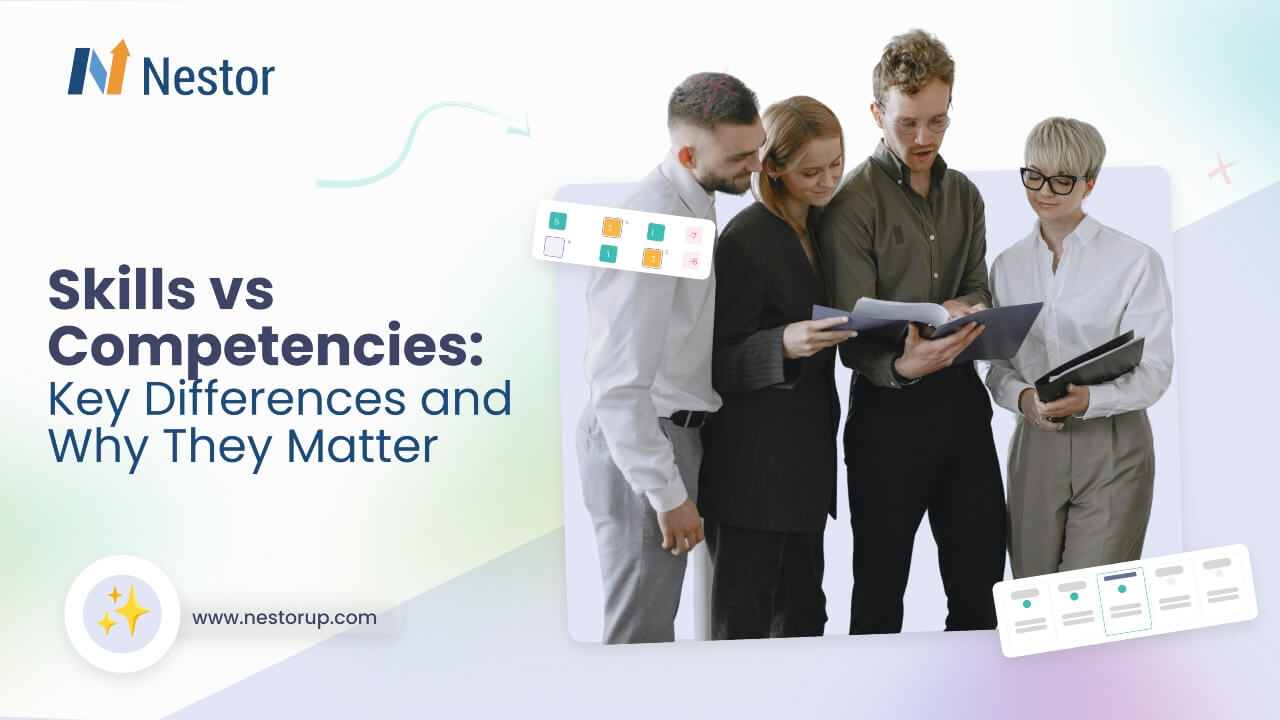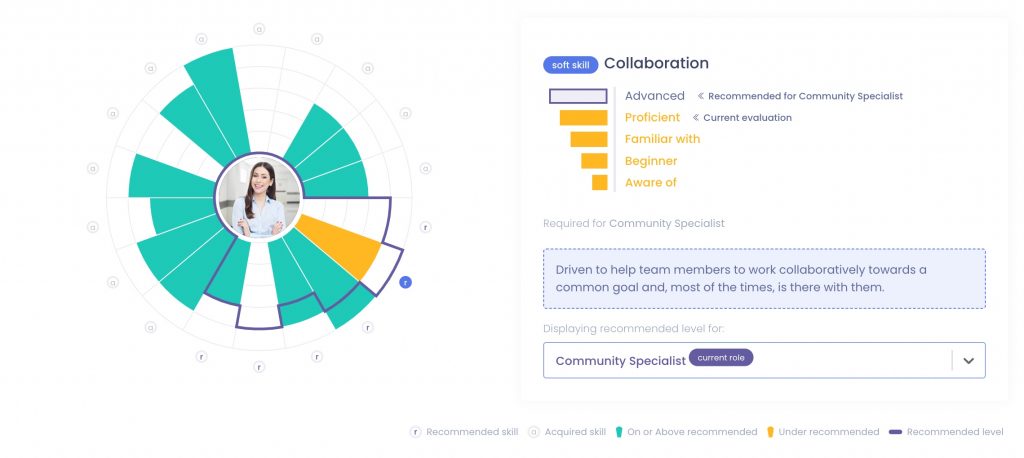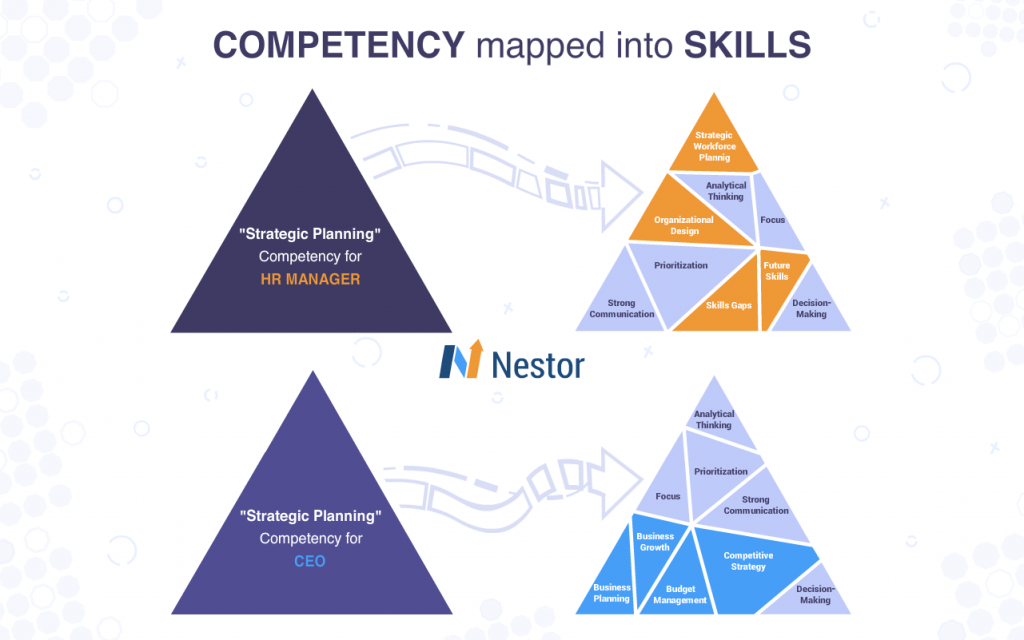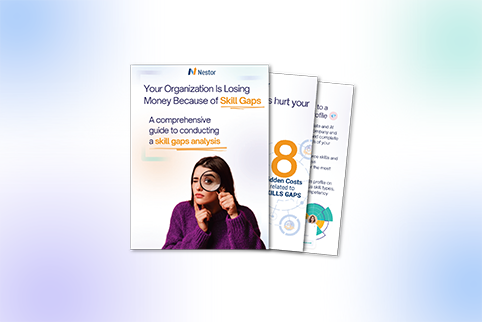
Contents
While the title of this article — skills vs competencies — could make one think these two are conflicting concepts, the exact opposite is true. Skills and competencies complement each other and play a crucial role in the hiring, engagement, performance, and promotion of your employees.
While we’ll be comparing skills and competencies, our focus will be on highlighting the subtle differences between them. We’ll look at their definitions, and their importance, and explore a specific example that highlights the differences of skills vs competencies. Let’s dive right in!
Skills vs Competencies: What is the Difference?
To establish a clear distinction between skills vs competencies, we’ve had to go beyond common dictionary definitions, which roughly describe both skills and competencies as “an important skill or ability to do something well”.
What Are Skills?
Skills are abilities developed through training, education, or experience that allow an individual to perform specific tasks effectively. Skills are typically more concrete than competencies and can be demonstrated through practical assignments or job performance.
Types of Skills
Skills are often categorized into two primary types: soft skills and hard (technical) skills.
- Soft Skills: These are people-oriented and behavioral skills that are more subjective in nature. Examples include communication, empathy, decision-making, conflict resolution, and leadership.
- Hard Skills: These are technical, often job-specific abilities that can be measured. Examples include programming, accounting, graphic design, data analysis, and engineering.
Measuring Skills
Skills are usually measurable and assessed on proficiency levels, such as:
- Beginner: Basic understanding of concepts and tasks.
- Intermediate: Moderate proficiency with the ability to solve problems independently.
- Advanced: High proficiency and ability to perform tasks with little or no supervision.
- Expert: Mastery and deep knowledge in a specific field.
For example, on the Nestor platform, skills can be assessed on a customizable grid starting with the first level – Aware of -> Beginner -> Familiar with -> Proficient and finally the last level defined as Advanced.

Most skills fall into one of these categories:
- soft or human skills: communication, time management, persuasion
- hard or technical skills: programming, graphic design, accounting
Despite ranging in terms of complexity, skills can be improved rapidly over time, especially when the necessary support is in place. They are also more transferable (especially human skills), which means mastering a skill in one area can serve both the employee and the company when they move to a different role or department.
What Are Competencies?
Competencies are broader and more complex. They include a mix of knowledge, behaviors, attitudes, traits, and personal abilities that enable individuals to excel in a role. Unlike skills, competencies are often harder to define and measure. They represent the qualities and characteristics that contribute to long-term success in a particular position or job function.
Types of Competencies
Competencies can be divided into several categories:
- Core Competencies: These are the essential skills and attributes that provide individuals or organizations with a competitive advantage. For example, adaptability or problem-solving.
- Management Competencies: These competencies focus on the abilities needed to be an effective leader or manager, such as decision-making, team management, and strategic thinking.
- Technical Competencies: Job-specific competencies that include a combination of hard skills and behavioral traits. For example, a software engineer needs technical competencies in programming as well as problem-solving and teamwork.
Check out other types of competencies.
Skills are part of someone’s competency, but competency isn’t a part of someone’s skills.
Due to their more complex nature, competencies aren’t always easily measured and can take longer — sometimes many years — to develop. One of the reasons why competencies take longer to develop is that changes in personal behaviors and attitudes are more difficult to make and track than changes in skills, as a result of upskilling or reskilling initiatives.
Skills and Competencies Frameworks
Understanding the distinction between skills vs competencies is foundational, but applying this knowledge requires structured frameworks. These frameworks serve as blueprints for identifying, developing, and evaluating the capabilities essential for various roles within an organization.
Competency Frameworks
Competency frameworks encapsulate a combination of skills, behaviors, and attributes that contribute to effective performance. They provide a holistic view of what success looks like in a role, beyond mere task completion.
- SHRM Competency Model: Developed by the Society for Human Resource Management, this model outlines key behavioral competencies such as leadership, ethical practice, and business acumen, alongside technical HR expertise.
- Lominger Competency Model: This model identifies 67 competencies, categorized into areas like personal attributes, interpersonal skills, and strategic capabilities, offering a comprehensive approach to talent development.
- European e-Competence Framework (e-CF): Widely adopted in the ICT sector, the e-CF provides a common language for competencies, facilitating alignment across European organizations.
Skills Frameworks
Skills frameworks focus on specific abilities and proficiencies required to perform tasks effectively. They are often used to assess and develop technical expertise.
- Skills Framework for the Information Age (SFIA): SFIA offers a structured approach to defining and managing skills across various levels of responsibility, particularly in IT and digital roles.
- ESCO (European Skills, Competences, Qualifications and Occupations): ESCO provides a multilingual classification of skills and occupations, supporting labor mobility across Europe.
Implementing these frameworks enables organizations to align talent strategies with business objectives, ensuring a cohesive approach to workforce development.
Competencies vs Skills: What is the Relationship Between These Two Concepts?
As we were saying before, competencies are usually job-related and reflect the desired behaviors to perform well in a particular role. The bad news is that “behaviors” are difficult to define and measure.
The good news is that typically, each competency can be translated into multiple skills that together can reflect that competency. Breaking down competencies into specific skills allows organizations to assess in a more accurate way employees’ strengths, weaknesses, and areas for improvement.
This process facilitates targeted skill development and the overall improvement of that competency based on assessing the proficiency level of an individual in each specific skill. Also, by defining multiple skills, it becomes easier for individuals to understand what range of abilities within that competency they should develop.
Unlike skills, competencies are not transferable and may vary depending on the industry standard, type of organization, team, or project.

Practical Example: Strategic Planning as a Competency
Let’s look at a practical example to illustrate competencies vs skills.
Strategic planning is a competency that may require different skills depending on the role. For example:
- HR Manager: Strategic planning for an HR manager might require soft skills like decision-making and prioritization. It might also require specific technical skills like strategic workforce planning or understanding skill gaps.
- CEO: Strategic planning for a CEO might involve the same soft skills but would also require specific business-related skills like budget management, business growth strategy, or stakeholder management.
In this case, both roles require the competency of “strategic planning,” but the skills needed to demonstrate that competency differ significantly. This shows how competencies are more versatile and general, while skills are specific to a given context.
Skills vs Competencies: Which Are More Important?
Does the example above means we should drop off competencies and look more at skills? The truth is that both skills and competencies are important and play a crucial role in the overall performance and development of an employee or organization.
In fact, since they are intertwined, it’s not a matter of which one is more important but rather how they are important. We can look at skills as the ‘what’ in this equation. They represent what a person can do and at what level.
Competencies, on the other hand, are the ‘how’. They are the ones that enable employees to be top performers and achieve a high level of success.
However, while you can still consider both skills and competencies based on determining the connection between these two models, a structure focused on skills has certain benefits.
The Interdependence of Skills and Competencies
Instead of comparing skills and competencies as competing factors, we must understand their interdependence. For example, a competency like “leadership” requires a blend of several skills:
- Communication skills: Ability to clearly convey messages and expectations.
- Decision-making skills: The ability to make quick, informed choices that benefit the team or organization.
- Problem-solving skills: Identifying and resolving challenges faced by the team or organization.
Without these specific skills, the competency of leadership cannot be effectively demonstrated. Conversely, having strong communication or decision-making skills alone might not lead to effective leadership if the broader competencies (emotional intelligence, vision, etc.) aren’t in place.
How to Assess Skills vs Competencies
Understanding how to assess skills and competencies is critical to building a capable, agile workforce. However, because they represent different dimensions of professional capability, they require distinct—yet often complementary—approaches to evaluation.
Assessing Skills: Measurable and Task-Oriented
Skills are typically easier to measure because they’re action-based and tied to observable tasks. Whether it’s coding in Python, managing a social media campaign, or operating a piece of machinery, skill assessments focus on what an individual can do.
Here are some common ways to assess skills:
- Technical Assessments
These are designed to test practical knowledge in a specific area. Examples include writing a block of code, solving a mathematical problem, or creating a mock design. These assessments help confirm a candidate’s proficiency in performing role-specific tasks. - Certifications and Credentials
Industry-recognized certifications serve as external validation of skill proficiency. Think PMP for project management, Salesforce certifications for CRM, or AWS for cloud services. These are especially valuable during hiring or reskilling. - Digital Skill Tests (LMS or Assessment Platforms)
Platforms like LinkedIn Learning offer scalable skill assessments that can be customized by difficulty level. They allow teams to monitor progress, identify gaps, and recommend personalized learning journeys. - Self-Assessments
While subjective, self-evaluations can offer a starting point when paired with manager reviews or peer feedback. On platforms like Nestor, this is often done via rating scales or skill matrices. - Portfolios and Project-Based Assessments
For creative, marketing, or software roles, assessing past work (campaigns, portfolios, repositories) offers a more holistic perspective than standardized tests alone.
Assessing Competencies: Behavioral and Role-Based
Competencies reflect how someone performs their role—how they communicate, collaborate, solve problems, and lead. These are often broader and embedded in the behavioral fabric of an organization.
Assessing competencies typically involves:
- Behavioral Interviews
These use the STAR method (Situation, Task, Action, Result) to evaluate past behavior as an indicator of future performance. For example, “Tell me about a time you had to persuade a team to shift direction.” - 360-Degree Feedback
This approach collects input from multiple stakeholders—managers, peers, subordinates, and sometimes clients—to evaluate how consistently someone demonstrates key competencies across different scenarios. - Managerial Reviews & Performance Check-Ins
Regular performance evaluations are critical to competency assessments. Structured rubrics or scorecards help managers gauge attributes like leadership, adaptability, or strategic thinking. - Scenario-Based Evaluations
These simulate real-life challenges and require the employee to demonstrate behavior aligned with organizational values and expectations. Think of them as “competency case studies.” - Psychometric Testing
Tools like DiSC, MBTI, or emotional intelligence (EQ) assessments are frequently used to understand interpersonal and intrapersonal competencies. - Peer Feedback and Observations
Soft skills—like collaboration and influence—are best observed over time. Peer insights often reveal how an employee behaves in less formal, real-world situations.
The Complementary Nature of Skills and Competencies in the Workplace
Skills and competencies work together to drive performance. When viewed in isolation, neither gives the full picture of employee potential. Let’s look at a few examples:
1. Sales Representative Role
- Skills: A sales representative needs a variety of technical skills, including proficiency in using CRM (Customer Relationship Management) software, knowledge of sales techniques, lead generation, and the ability to conduct market research. Sales representatives should also have product knowledge and the ability to deliver persuasive sales presentations.
- Competencies: In addition to the technical skills mentioned, key competencies in this role include relationship-building, customer empathy, resilience, persuasion, and strategic thinking. Sales representatives need to be able to understand customer needs, handle objections effectively, build trust, and close deals. These competencies ensure that the sales process is smooth and that the representative can navigate challenging or complex sales cycles.
How They Work Together: The sales representative uses their CRM skills to manage leads, track sales, and analyze customer data. However, it’s their competency in relationship-building and customer empathy that enables them to forge lasting connections with clients, leading to repeat business. Resilience and persuasion allow them to recover from rejections and continue pushing forward to meet sales targets. The technical skills in CRM and data analysis help them optimize their sales process, but the competencies in empathy and persuasion are what drive meaningful customer interactions and successful deals.
2. Human Resources (HR) Manager Role
- Skills: An HR manager must have skills in HR software, talent acquisition, payroll management, and understanding of labor laws and organizational policies.
- Competencies: The competencies in this role include emotional intelligence, conflict resolution, leadership, and the ability to understand organizational culture and dynamics. HR managers not only handle the technical aspects of managing employees but also ensure a positive workplace culture and resolve interpersonal conflicts that could arise within the team.
How They Work Together: An HR manager uses their technical skills to handle administrative tasks like payroll or benefits management, but their competencies in conflict resolution and leadership enable them to foster a productive work environment and mediate difficult situations effectively. They can integrate these competencies into their day-to-day role to create a healthy organizational culture and retain talent.
3. Marketing Manager Role
- Skills: A marketing manager needs skills in digital marketing, SEO (search engine optimization), data analytics, and the use of marketing platforms like Google Ads and social media tools.
- Competencies: Competencies required for this role include strategic thinking, creativity, adaptability, and collaboration. Marketing managers must not only know how to execute campaigns but also develop strategies, adapt to shifting market trends, and collaborate with cross-functional teams (e.g., sales, product development).
How They Work Together: A marketing manager may use their technical skills in digital tools and data analysis to implement campaigns, but their competency in strategic thinking helps them analyze trends, create actionable marketing strategies, and adapt those strategies as needed to achieve the organization’s goals.
4. Customer Service Representative Role
- Skills: A customer service representative must have skills in using helpdesk software, managing customer inquiries via email, phone, or live chat, and troubleshooting common issues.
- Competencies: The competencies in this role include emotional intelligence, patience, conflict resolution, and active listening. A customer service representative who can empathize with customers and resolve complaints calmly is likely to deliver exceptional service, beyond simply knowing how to use the system.
How They Work Together: While a customer service representative’s technical skills allow them to manage customer issues efficiently, it’s their emotional intelligence and ability to manage difficult conversations that ensure customer satisfaction and retention. These competencies allow them to transform basic customer service tasks into opportunities for creating loyal, happy customers.
5. Project Management Role
- Skills: A project manager needs a range of technical skills such as proficiency in project management software (e.g., Microsoft Project, Trello, Asana), budgeting, scheduling, and risk management.
- Competencies: The core competencies for a project manager include leadership, communication, negotiation, and decision-making under pressure. A project manager must know how to direct and motivate teams, communicate project status to stakeholders, and make critical decisions about resource allocation and risk mitigation. These competencies are what ensure that technical skills in planning and execution translate into successful project outcomes.
How They Work Together: The project manager uses their software skills to create project plans and schedules but must rely on leadership competencies to navigate complex team dynamics and ensure that the project progresses smoothly. Without the competencies of communication and leadership, the technical planning skills may not result in a well-executed project.
Benefits of Skills vs Competencies for the Future of Work
Tracking Skills Progress Over Time
In the context of talent development, tracking skills offers several practical advantages that help organizations ensure employees are progressing in the right direction.
- Clear Benchmarks for Growth: Skills are easier to measure than competencies, which means tracking skills allows organizations to establish clear benchmarks. For example, if a software developer is assessed on their proficiency in Python, their growth can be tracked from beginner to expert. These benchmarks provide tangible data on how much improvement has been made.
- Continuous Learning and Development: With skills, the development process becomes more continuous and iterative. By using performance data, organizations can identify which skills need to be improved or developed further. This real-time insight allows for quicker interventions in the form of training, upskilling, or reskilling initiatives.
For instance, organizations that use platforms like Nestor to assess skills can gain detailed insights into which employees need additional support and which are ready for greater responsibilities. This ensures that development efforts are not generic but tailored to the precise needs of each employee.
Skills Are the Foundation of Internal Talent Marketplaces
As businesses adapt to the future of work, internal talent marketplaces are becoming a powerful tool to ensure the efficient use of resources. These marketplaces are platforms within organizations where employees can showcase their skills and connect with new roles or projects that match their expertise.
- Agility in Talent Allocation: Internal talent marketplaces are built on the foundation of skills because they enable quick and effective redeployment of talent. When an organization needs a developer with expertise in cloud computing or a data analyst with experience in machine learning, the talent marketplace matches internal employees with the specific skill set needed, saving time and resources compared to external hiring.
- Employee Growth and Retention: A robust internal talent marketplace doesn’t just fill immediate gaps; it also fosters long-term growth for employees. By knowing that they can move between roles and continue developing their skills, employees are more likely to stay with the organization, reducing turnover and fostering loyalty.
In an age where agility is key, the transferability of skills within an internal talent marketplace enables organizations to remain flexible and responsive to changes in the marketplace, technology, or internal needs.
Skills Enable Intelligent Workforce Planning
Intelligent workforce planning refers to the strategic use of skills data to plan for future talent needs and to manage the workforce proactively.
- Decoupling Skills from Specific Roles: In the traditional job-based model, employees are often confined to a set of skills required by their job title. However, focusing on skills rather than specific job roles enables organizations to redeploy talent across different departments or projects as needed. For example, an employee with strong project management skills could be reassigned from marketing to operations, supporting a more agile workforce.
- Identifying Hidden Potential: By focusing on skills assessments, organizations can uncover hidden talent within the workforce. For instance, an employee may have expertise in data analysis, but their current role doesn’t fully utilize this skill. Intelligent workforce planning enables organizations to recognize such skills, allowing employees to move into more suitable roles where they can make a greater impact.
- Predicting Future Talent Gaps: Skills data can also help predict which roles will be needed in the future and which skills will be in demand. For instance, if an organization identifies that artificial intelligence skills are growing in importance, it can start investing in upskilling initiatives to ensure the workforce is prepared for future needs.
Skills Support Smart Decisions About Internal Development vs External Hiring
Often, the best candidates for leadership roles or specialized positions are already working within the company.
- Internal Mobility: Skills assessments help identify employees with the potential to step into new roles or leadership positions. Instead of hiring externally, organizations can look inward, saving on recruitment costs and accelerating the onboarding process.
- Cost-Effectiveness and Efficiency: Internal candidates already understand the company culture and systems, making them more likely to succeed in new roles. Upskilling existing employees is also generally more cost-effective than hiring from outside the company, especially when considering the time and money spent on recruitment and training new employees.
For instance, if an organization needs a senior marketing strategist but already has a mid-level marketing analyst who has the requisite skills and potential, upskilling the internal candidate is often a more efficient and cheaper option than hiring externally.
The Role of Technology in Managing Skills and Competencies
Digital transformation is not just about tools; it’s about people. The role of technology in managing skills and competencies has moved beyond HR systems to become a core part of talent and business strategy. Today’s technology enables smarter decisions, faster development cycles, and greater workforce agility.
From Spreadsheets to AI-Driven Platforms
Traditionally, HR tracked skills and competencies through manual tools; often scattered across Excel sheets, performance reviews, and learning records. But these static snapshots were difficult to update, lacked consistency, and couldn’t support real-time talent strategies.
A modern platform like Nestor changes that. It offers integrated, dynamic, and data-driven systems that connect learning, performance, and succession planning into one centralized hub.
Skill and Competency Identification
Technology enables organizations to:
- Map Current Capabilities: AI can extract skills from resumes, LinkedIn profiles, and internal performance data to automatically generate a skill profile for each employee.
- Match Roles to Competencies: By using pre-built or customizable frameworks, HR teams can match competencies to job descriptions and assess role-readiness more accurately.
Skill Gap Analysis and Forecasting
- Proactive Gap Identification: Platforms can identify the gap between current skills and the skills required for future roles, projects, or strategic initiatives.
- Scenario Planning: What if your company shifted to a new business model? Tech-enabled scenario planning allows you to predict which competencies would be critical and which teams need upskilling.
Personalized Learning and Upskilling
AI and machine learning recommend tailored learning paths based on assessed gaps.
- Microlearning Integration: Bite-sized lessons, linked to actual skill gaps, boost engagement and retention.
- Integrated Learning Experience Platforms (LXPs): These connect assessments with learning modules, career pathways, and real-time feedback loops.
Performance and Development Insights
Modern platforms don’t just record data. They generate insights.
- Dashboards show a heatmap of skill distribution across departments.
- Talent Analytics help identify hidden high performers or those ready for leadership development.
- Competency Trends can be tracked across time and visualized across job families, making workforce planning far more strategic.
Continuous Feedback and Career Mobility
- Real-Time Feedback Tools: Ongoing feedback can be linked to both skills and competencies, reinforcing development efforts as they happen.
- Internal Talent Marketplaces: Skills-based platforms match employees to short-term projects, mentorships, or full-time roles based on their skill profiles.
Final Thoughts on Skills vs Competencies
As we’ve went through skills vs competencies, we’ve seen that the relationship between skills and competencies is symbiotic. Both are vital for creating a successful, adaptable, and high-performing workforce. While skills provide the technical expertise required for immediate job performance, competencies offer the broader framework for long-term success and organizational fit.
The future of work will demand a workforce that is agile, adaptable, and equipped with both highly specialized skills and the broad competencies that enable them to thrive in dynamic environments.
If you need help getting started, we’re always here to help.
Frequently Asked Questions (FAQ) About Skills vs Competencies
What’s the real difference between skills and competencies, and why does it matter?
Skills are specific, teachable abilities that enable someone to perform a task. Competencies, on the other hand, are broader and combine knowledge, behaviors, and personal traits that influence how effectively someone performs in a role. Understanding the distinction helps organizations not only match people to the right roles but also invest in development that drives long-term performance, adaptability, and leadership growth.
Are competencies always job-specific?
Not necessarily. Some competencies—like adaptability, communication, or ethical judgment—are relevant across many roles. However, how they are demonstrated and combined with job-specific skills can vary depending on the function, seniority, or industry.
Can you develop competencies the same way you develop skills?
Not quite. Skills can often be developed quickly through training, practice, or experience. Competencies, however, take longer because they require behavioral change, mindset shifts, and reinforcement in real-world scenarios. This is why a blended approach (learning + coaching + feedback) works best for competency development.
How can organizations create clear skill and competency models for each role?
To build effective models, organizations should start with a detailed analysis of what success looks like in each role—looking at high performers, performance data, and strategic outcomes. Then, they can define core competencies that apply across the organization, along with role-specific ones, and link them to the technical and soft skills needed for execution. These frameworks should be dynamic, regularly updated, and integrated into performance management, learning paths, and career progression systems.
How do you assess whether someone is truly ready for a leadership role from a competency perspective?
Assessing leadership readiness requires more than evaluating technical proficiency. It involves looking at how someone demonstrates behaviors like strategic thinking, resilience, decision-making, and emotional intelligence under pressure. This can be evaluated through structured interviews, behavioral assessments, 360-degree feedback, and simulations that reflect real-world leadership scenarios.
How should learning and development programs be designed to target both skills and competencies?
The most effective programs take a dual approach: they provide content that helps employees build specific skills through courses or certifications, while also creating opportunities to develop competencies through coaching, mentoring, cross-functional projects, and reflective feedback. L&D initiatives should align with business goals, role requirements, and personal development plans, allowing for personalized paths that address both what employees need to know and how they should apply it in practice.
How do you ensure your competency and skill frameworks stay relevant?
To stay aligned with business needs and the changing world of work, frameworks should be reviewed regularly—ideally every 6 to 12 months—or whenever there’s a major strategic shift. This includes gathering feedback from employees, analyzing performance trends, and staying up to date with industry benchmarks. With the help of AI-powered tools and learning platforms, organizations can continuously refresh frameworks and keep them tightly linked to business outcomes.








